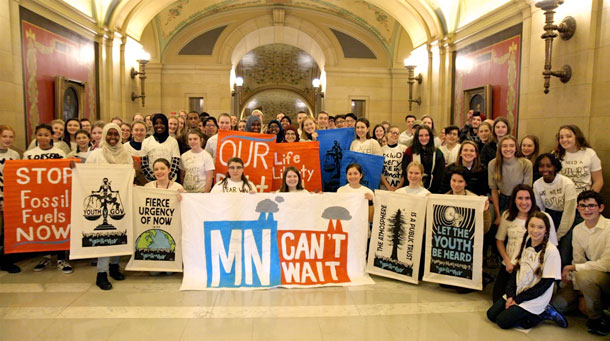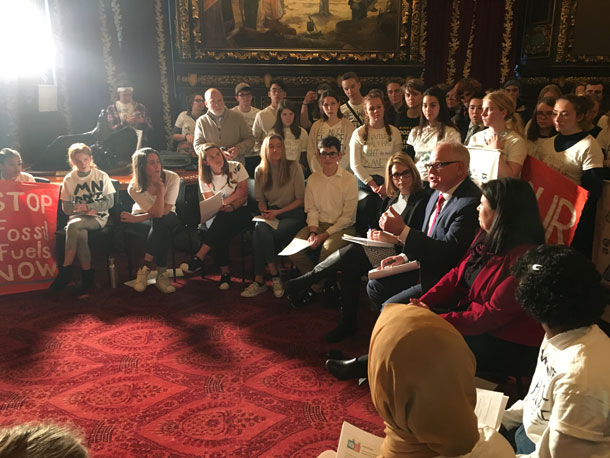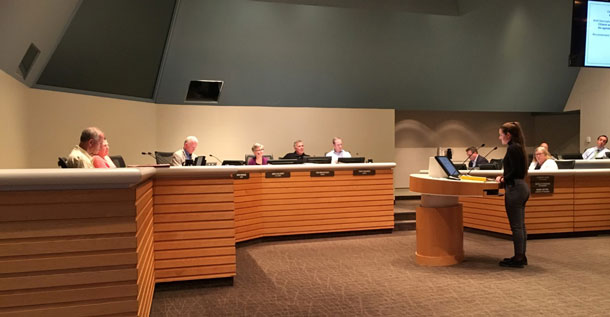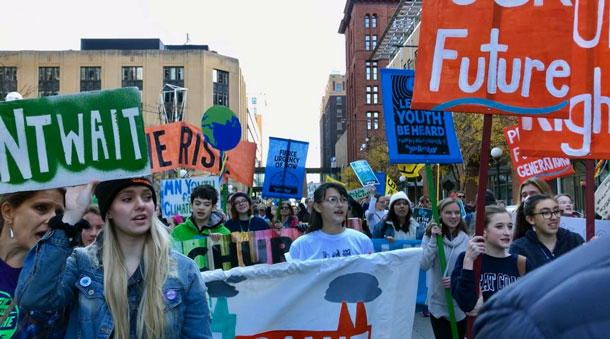Youth Activists Call for a Minnesota Green New Deal
Air Date: Week of January 18, 2019

Minnesota Can’t Wait youth activists held a rally at the Minnesota State Capitol on January 9, 2019. (Photo: Devon Cupery)
Youth activists in Minnesota aren’t waiting to see what may happen with a national Green New Deal. Through a group called Minnesota Can’t Wait, they’re starting a conversation with Governor Tim Walz (D-MN) about transitioning the state away from fossil fuels, while creating clean energy jobs and other sustainable economic growth. Youth activist Lia Harel, a student at Hopkins High School, speaks with Host Steve Curwood about the group’s vision for climate action in Minnesota.
Transcript
CURWOOD: Social change often comes in America through the states, whether it was Wyoming that first gave women the vote or the Massachusetts Supreme Judicial Court that ruled gay people have the right to marry. Today a group of high schoolers in Minnesota are pushing that state to become the first to enact a Green New Deal, to address the climate crisis with a progressive social and economic agenda. Nationally more than 600 environmental groups have together called for a Green New Deal, but so far there has been no federal action. Meanwhile a youth group called Minnesota Can’t Wait recently planned a sit-in at the Minnesota’s governor’s office that morphed an alliance with the governor and lieutenant governor to develop actual legislation that would implement a Green New Deal. One of those young activists is Lia Harel. She’s a senior and environmental club leader at Hopkins High School, and in iMatter, a youth climate action advocacy group. She joins me now from Minnetonka. Lia, welcome to Living on Earth!
HAREL: Hi, thank you for having me.
CURWOOD: Lia, why did you decide to get involved in climate advocacy?
HAREL: Well, I began climate advocacy not too long ago. When I was a sophomore, I joined my high school's Earth Club. And I came in expecting to talk about saving the polar bears and picking up trash in the community. And I quickly recognized that climate change, and environmental justice issues, impact so many more sectors of our society, you know, our public health, our food security, our infrastructure and economy. And I had this major epiphany moment, that this is the reality and the reality is threatening my future.
CURWOOD: Tell me how you help form your Minnetonka Climate Initiative.
HAREL: Well, my high school’s Earth Club, we heard about some great work that other high schoolers were doing in neighboring schools with iMatter and we wanted to do something in Minnetonka as well. And so Hopkins High School partnered with Minnetonka High School, like an neighboring community, and we presented to the city our research on what we think the city is doing at addressing climate change. And we recognize that while the city is taking great steps, there are still more that can be done. Right now, we don't have any type of Climate Action Plan that would lay out how we're going to address reducing our emissions and transitioning to more renewable electricity. And specifically, the goals of what we want in a climate action would be that our city would transition to 100% renewable electricity by the year 2030, and have net zero greenhouse gas emissions by 2040. And right now we're in the process of working with the city and seeing how we can put those asks into action.

On January 9, 2019, over 100 youth activists with the organization Minnesota Can’t Wait met with Governor Tim Walz to demand state action on climate change. (Photo: courtesy of iMatter)
CURWOOD: Now, I understand you've gone to the state level where you're doing some advocacy with the group Minnesota Can't Wait; please tell me briefly about what the Minnesota Can't wait proposal is and what that all involves.
HAREL: So the Minnesota Can't Wait movement is a youth-led movement with support from other organizations such as iMatter and Climate Generation. And we have three main points of our platform. So the first main point is for executive action from Governor Walz to regulate statewide greenhouse gas emissions. The second point is for no more fossil fuel infrastructure, such as the Line 3 pipeline. And the third point is for a Minnesota Green New Deal bill, which aims at creating an equitable transition to a sustainable economy.
CURWOOD: Let's talk about those. So far how is the governor, Governor Walz, responding to your request to regulate greenhouse gases?
HAREL: Well, actually, just recently, on January 9, we had a huge event and we had 100 to 150 youth come to his office, and we had a meeting with him, along with the Lieutenant Governor and the Pollution Control Agency Commissioner, and we sat down and we had a few speeches and inspiring stories from young climate activists. And we very specifically stated, how are you going to follow up with your commitment to prioritize climate action? And how are you going to start taking action on regulating greenhouse gas emissions? And he made a point to emphasize that, yes, climate change is very important to his administration, and we're looking forward to continuing the conversation and collaborating with them.
CURWOOD: Now, your second point was you want to transition to a renewable economy, no more fossil fuels.
HAREL: Correct.
CURWOOD: Okay. How do you do that?
HAREL: Well, it's definitely a complicated task. And again, I'm not the expert, but it's definitely something that we need to do. And so we need to stop investing in more projects that continue our dependency on fossil fuels, such as Line 3, that would transport crude oil through Minnesota and through Mississippi headwaters and Native American treaty land. And right now, in order to stop our dependency, we need to divert our money into investments of renewable energy as soon as possible.

Youth activist Lia Harel addressed the Minnetonka City Council on April 30, 2018 as part of a Minnetonka Climate Initiative effort to call for city actions to address climate change. (Photo: courtesy of iMatter)
CURWOOD: Now on the Green New Deal, what's the specific piece of legislation that you're crafting for the Minnesota Green New Deal?
HAREL: Well, the policies we’re still right now outlining; we're drafting the bill currently, and the specifics of it are not laid out. But if we think about the term Green New Deal, the words New Deal refer to FDR's economic stimulus package. And what we're trying to emphasize with the Green New Deal is that we're not shutting down our economy in order to save the planet. What we're doing is we're reforming our economy in order to keep moving forward and live life in a way that is sustainable.
CURWOOD: Now, FDR's New Deal had, yes, an economic component. But it was also very much a social change component, to give people living wages, to change the way things had been done. But to what extent in your mind does a Green New Deal, talk about changing the way that as a society, we relate to each other, as well as just the money?
HAREL: Well definitely we've seen with the national Green New Deal, there's been quite an emphasis on making sure that we're incorporating all voices into the conversation. So people of color, marginalized communities, Indigenous peoples, making sure that as we're creating a transition, we're not leaving people behind. And yes, there's that social aspect, because in order to address a lot of social issues, environmental issues are directly related with that.
CURWOOD: What special advantages do you think Minnesota has in moving ahead with its own Green New Deal? You folks are known for being so polite.
HAREL: [LAUGHS] Well, yes, we're polite, but we're stern. And I think Minnesota is already a leader in a lot of climate related policies. And we can continue to be a leader and we can be a model for other states. These policies and these social justice issues are coming about through state action, because that is the way that we can inspire each other. It's not all of a sudden, everyone at once understands an issue, it takes time, and it takes gradual transitions, but transitions that actually do happen in order to bring about that change.

Youth leaders from iMatter and partnering environmental organizations held a rally and march to the Minnesota State Capitol on October 28, 2018 in solidarity with the Juliana v. United States plantiffs. The youth plaintiffs are suing the federal government for allegedly violating their constitutional rights by contributing to climate change. (Photo: courtesy of Lia Harel)
CURWOOD: Who inspires you most in this movement? Or who are a few people who inspire you a lot in this movement?
HAREL: You know, I think it's the young people. I have a friend who has been working on these issues since she was very young. There's a 13 year old in this movement. And I'm just amazed; you know, none of us really think of our age as something that limits what we think we're able to do. We all see each other as human beings, and we all value each other. And I think sometimes it's not always easy for people to see why it's important now, and you know, you can show people the facts and the figures, but that doesn't really stick with them. But when you hear the calls of young people asking for a change, and to make sure that our future is healthy, then why shouldn't we start now? Why should we wait to do this? What is the benefit of waiting if the more action we take now, the brighter our outcome.
CURWOOD: Lia Harel is a senior at Hopkins High School in Minnetonka, Minnesota. Lia, thanks so much for taking the time with us today.
HAREL: Yeah, thank you very much.
Links
Grist | “Minnesota youth demand Green New Deal in meeting with governor”
Lia Harel is a youth leader with the Minnetonka chapter of iMatter
Living on Earth wants to hear from you!
Living on Earth
62 Calef Highway, Suite 212
Lee, NH 03861
Telephone: 617-287-4121
E-mail: comments@loe.org
Newsletter [Click here]
Donate to Living on Earth!
Living on Earth is an independent media program and relies entirely on contributions from listeners and institutions supporting public service. Please donate now to preserve an independent environmental voice.
NewsletterLiving on Earth offers a weekly delivery of the show's rundown to your mailbox. Sign up for our newsletter today!
 Sailors For The Sea: Be the change you want to sea.
Sailors For The Sea: Be the change you want to sea.
 The Grantham Foundation for the Protection of the Environment: Committed to protecting and improving the health of the global environment.
The Grantham Foundation for the Protection of the Environment: Committed to protecting and improving the health of the global environment.
 Contribute to Living on Earth and receive, as our gift to you, an archival print of one of Mark Seth Lender's extraordinary wildlife photographs. Follow the link to see Mark's current collection of photographs.
Contribute to Living on Earth and receive, as our gift to you, an archival print of one of Mark Seth Lender's extraordinary wildlife photographs. Follow the link to see Mark's current collection of photographs.
 Buy a signed copy of Mark Seth Lender's book Smeagull the Seagull & support Living on Earth
Buy a signed copy of Mark Seth Lender's book Smeagull the Seagull & support Living on Earth

